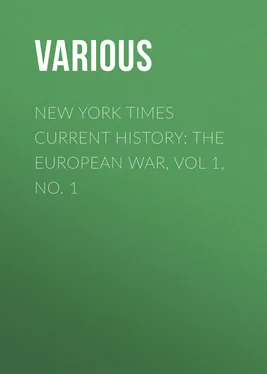Various - New York Times Current History - The European War, Vol 1, No. 1
Здесь есть возможность читать онлайн «Various - New York Times Current History - The European War, Vol 1, No. 1» — ознакомительный отрывок электронной книги совершенно бесплатно, а после прочтения отрывка купить полную версию. В некоторых случаях можно слушать аудио, скачать через торрент в формате fb2 и присутствует краткое содержание. Жанр: foreign_edu, periodic, История, на английском языке. Описание произведения, (предисловие) а так же отзывы посетителей доступны на портале библиотеки ЛибКат.
- Название:New York Times Current History: The European War, Vol 1, No. 1
- Автор:
- Жанр:
- Год:неизвестен
- ISBN:нет данных
- Рейтинг книги:4 / 5. Голосов: 1
-
Избранное:Добавить в избранное
- Отзывы:
-
Ваша оценка:
- 80
- 1
- 2
- 3
- 4
- 5
New York Times Current History: The European War, Vol 1, No. 1: краткое содержание, описание и аннотация
Предлагаем к чтению аннотацию, описание, краткое содержание или предисловие (зависит от того, что написал сам автор книги «New York Times Current History: The European War, Vol 1, No. 1»). Если вы не нашли необходимую информацию о книге — напишите в комментариях, мы постараемся отыскать её.
New York Times Current History: The European War, Vol 1, No. 1 — читать онлайн ознакомительный отрывок
Ниже представлен текст книги, разбитый по страницам. Система сохранения места последней прочитанной страницы, позволяет с удобством читать онлайн бесплатно книгу «New York Times Current History: The European War, Vol 1, No. 1», без необходимости каждый раз заново искать на чём Вы остановились. Поставьте закладку, и сможете в любой момент перейти на страницу, на которой закончили чтение.
Интервал:
Закладка:
Mr. Asquith had also to distract public attention from the fact that three official members of his Government, all men of unquestioned and conspicuous patriotism and intellectual honesty, walked straight out into private life on the declaration of war. One of them, Mr. John Burns, did so at an enormous personal sacrifice, and has since maintained a grim silence far more eloquent than the famous speech Germany invented for him. It is not generally believed that these three statesmen were actuated by a passion for the violation of Belgian neutrality.
On the whole, it was impossible for the Government to seize its grand chance and put itself at the head of the popular movement that responded to Sir Edward Grey's declaration: the very simple reason being that the Government does not represent the nation, and is in its sympathies just as much a Junker government as the Kaiser's. And so, what the Government cannot do has to be done by unofficial persons with clean and brilliant anti-Junker records like Mr. Wells, Mr. Arnold Bennett, Mr. Neil Lyons, and Mr. Jerome K. Jerome. Neither Mr. Asquith nor Sir Edward Grey can grasp, as these real spokesmen of their time do, the fact that we just simply want to put an end to Potsdamnation, both at home and abroad. Both of them probably think Potsdam a very fine and enviable institution, and want England to out-Potsdam Potsdam and to monopolize the command of the seas; a monstrous aspiration. We, I take it, want to guarantee that command of the sea which is the common heritage of mankind to the tiniest State and the humblest fisherman that depends on the sea for a livelihood. We want the North Sea to be as safe for everybody, English or German, as Portland Place.
The Need for Recrimination.
And now somebody who would rather I had not said all this (having probably talked dreadful nonsense about Belgium and so forth for a month past) is sure to ask: "Why all this recrimination? What is done is done. Is it not now the duty of every Englishman to sink all differences in the face of the common peril?" etc., etc. To all such prayers to be shielded from that terrible thing, the truth, I must reply that history consists mainly of recrimination, and that I am writing history because an accurate knowledge of what has occurred is not only indispensable to any sort of reasonable behaviour on our part in the face of Europe when the inevitable day of settlement comes, but because it has a practical bearing on the most perilously urgent and immediate business before us: the business of the appeal to the nation for recruits and for enormous sums of money. It has to decide the question whether that appeal shall be addressed frankly to our love of freedom, and our tradition (none the less noble and moving because it is so hard to reconcile with the diplomatic facts) that England is a guardian of the world's liberty, and not to bad law about an obsolete treaty, and cant about the diabolical personal disposition of the Kaiser, and the wounded propriety of a peace-loving England, and all the rest of the slosh and tosh that has been making John Bull sick for months past. No doubt at first, when we were all clasping one another's hands very hard and begging one another not to be afraid, almost anything was excusable. Even the war notes of Mr. Garvin, which stood out as the notes of a gentleman amid a welter of scurrilous rubbish and a rather blackguardly Punch cartoon mocking the agony of Berlin ( Punch having turned its non-interventionist coat very promptly), had sometimes to run: "We know absolutely nothing of what is happening at the front, except that the heroism of the British troops will thrill the ages to the last syllable of recorded time," or words to that effect. But now it is time to pull ourselves together; to feel our muscle; to realize the value of our strength and pluck; and to tell the truth unashamed like men of courage and character, not to shirk it like the official apologists of a Foreign Office plot.
What Germany Should Have Done.
And first, as I despise critics who put people in the wrong without being able to set them right, I shall, before I go any further with my criticism of our official position, do the Government and the Foreign Office the service of finding a correct official position for them; for I admit that the popular position, though sound as far as it goes, is too crude for official use. This correct official position can be found only by considering what Germany should have done, and might have done had she not been, like our own Junkers, so fascinated by the Militarist craze, and obsessed by the chronic Militarist panic, that she was "in too great hurry to bid the devil good morning." The matter is simple enough: she should have entrusted the security of her western frontier to the public opinion of the west of Europe and to America, and fought Russia, if attacked, with her rear not otherwise defended. The Militarist theory is that we, France and England, would have immediately sprung at her from behind; but that is just how the Militarist theory gets its votaries into trouble by assuming that Europe is a chess board. Europe is not a chess board; but a populous continent in which only a very few people are engaged in military chess; and even those few have many other things to consider besides capturing their adversary's king. Not only would it have been impossible for England to have attacked Germany under such circumstances; but if France had done so England could not have assisted her, and might even have been compelled by public opinion to intervene by way of a joint protest from England and America, or even by arms, on her behalf if she were murderously pressed on both flanks. Even our Militarists and diplomatists would have had reasons for such an intervention. An aggressive Franco-Russian hegemony, if it crushed Germany, would be quite as disagreeable to us as a German one. Thus Germany would at worst have been fighting Russia and France with the sympathy of all the other Powers, and a chance of active assistance from some of them, especially those who share her hostility to the Russian Government. Had France not attacked her—and though I am as ignorant of the terms of the Franco-Russian alliance as Sir Edward Grey is strangely content to be, I cannot see how the French Government could have justified to its own people a fearfully dangerous attack on Germany had Russia been the aggressor—Germany would have secured fair play for her fight with Russia. But even the fight with Russia was not inevitable. The ultimatum to Servia was the escapade of a dotard: a worse crime than the assassination that provoked it. There is no reason to doubt the conclusion in Sir Maurice de Bunsen's despatch (No. 161) that it could have been got over, and that Russia and Austria would have thought better of fighting and come to terms. Peace was really on the cards; and the sane game was to play for it.
The Achilles Heel of Militarism.
Instead, Germany flew at France's throat, and by incidentally invading Belgium gave us the excuse our Militarists wanted to attack her with the full sympathy of the nation. Why did she do this stupid thing? Not because of the counsels of General von Bernhardi. On the contrary, he had warned her expressly against allowing herself to be caught between Russia and a Franco-British combination until she had formed a counterbalancing alliance with America, Italy, and Turkey. And he had most certainly not encouraged her to depend on England sparing her: on the contrary, he could not sufficiently admire the wily ruthlessness with which England watches her opportunity and springs at her foe when the foe is down. (He little knew, poor man, how much he was flattering our capacity for Realpolitik!) But he had reckoned without his creed's fatal and fundamental weakness, which is, that as Junker-Militarism promotes only stupid people and snobs, and suppresses genuine realists as if they were snakes, it always turns out when a crisis arrives that "the silly people don't know their own silly business." The Kaiser and his ministers made an appalling mess of their job. They were inflamed by Bernhardi; but they did not understand him. They swallowed his flattery, but did not take in his strategy or his warnings. They knew that when the moment came to face the Franco-Russian alliance, they were to make a magnificient dash at France and sweep her pieces off the great chess board before the Russians had time to mobilize; and then return and crush Russia, leaving the conquest of England for another day. This was honestly as much as their heads could hold at one time; and they were helplessly unable to consider whether the other conditions postulated by Bernhardi were present, or indeed, in the excitement of their schoolboyish imaginations, to remember whether he had postulated any at all. And so they made their dash and put themselves in the wrong at every point morally, besides making victory humanly impossible for themselves militarily. That is the nemesis of Militarism: the Militarist is thrown into a big game which he is too stupid to be able to play successfully. Philip of Spain tried it 300 years ago; and the ruin he brought on his empire has lasted to this day. He was so stupid that though he believed himself to be the chosen instrument of God (as sure a sign of a hopeless fool in a man who cannot see that every other man is equally an instrument of that Power as it is a guarantee of wisdom and goodwill in the man who respects his neighbor as himself) he attempted to fight Drake on the assumption that a cannon was a weapon that no real gentleman and good Catholic would condescend to handle. Louis XIV. tried again two centuries ago, and, being a more frivolous fool, got beaten by Marlborough and sent his great-grandson from the throne to the guillotine. Napoleon tried it 100 years ago. He was more dangerous, because he had prodigious personal ability and technical military skill; and he started with the magnificent credential of the French Revolution. All that carried him farther than the Spanish bigot or the French fop; but he, too, accreted fools and knaves, and ended defeated in St. Helena after pandering for twenty years to the appetite of idiots for glory and bloodshed; waging war as "a great game"; and finding in a field strewn with corpses "un beau spectacle." In short, as strong a magnet to fools as the others, though so much abler.
Читать дальшеИнтервал:
Закладка:
Похожие книги на «New York Times Current History: The European War, Vol 1, No. 1»
Представляем Вашему вниманию похожие книги на «New York Times Current History: The European War, Vol 1, No. 1» списком для выбора. Мы отобрали схожую по названию и смыслу литературу в надежде предоставить читателям больше вариантов отыскать новые, интересные, ещё непрочитанные произведения.
Обсуждение, отзывы о книге «New York Times Current History: The European War, Vol 1, No. 1» и просто собственные мнения читателей. Оставьте ваши комментарии, напишите, что Вы думаете о произведении, его смысле или главных героях. Укажите что конкретно понравилось, а что нет, и почему Вы так считаете.











